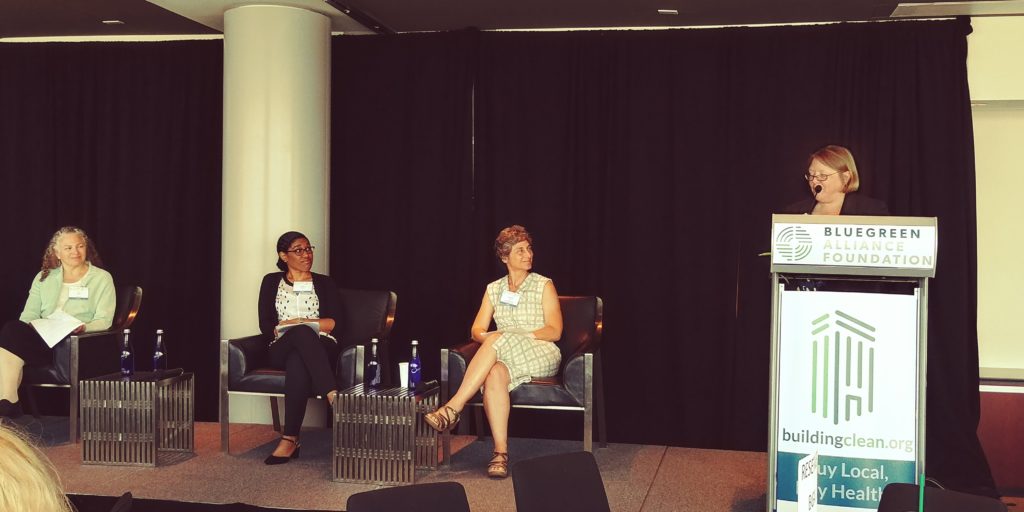Attendees Hear How EPA Budget, Policies May Force Us All to Pick Our Poison
Pick Your Poison: How Toxic Exposure Could Increase Under Proposed EPA Changes examined the current state of policies and personnel at the EPA and detailed how the public could be at increased risk from exposure to toxins in the environment and products.
The BlueGreen Alliance Foundation and BuildingClean.org hosted an event at the Newseum in Washington, D.C. earlier this month that focused on how the budget cuts proposed to the U.S. Environmental Protection Agency (EPA) and actions by the administration may force American workers and citizens to be exposed to more toxic chemicals in their every day lives.
The event, called Pick Your Poison: How Toxic Exposure Could Increase Under Proposed EPA Changes, examined the current state of policies and personnel at the EPA and detailed how the public could be at increased risk from exposure to toxins in the environment and products and what we can do to minimize this. It featured speakers including U.S. Rep. Paul Tonko (NY – 20), EPA union leaders, former EPA officials, representatives from the Natural Resources Defense Council (NRDC), Environmental Working Ground, Earthjustice, and the NAACP had enlightening discussions about how we may all be impacted by proposed cuts to the EPA and efforts by the Trump administration to change or rewrite rules focused on chemical safety.
Rep. Tonko kicked off the event with a rousing speech in which he said, “I think it is important for us to stand up and be vigilant in our attempt to understand that as we green up, we strengthen up the economy.”
… the EPA budget is one of the areas where, “the greatest harm can be done in the shortest time.”
Former EPA official George Wyeth spoke before the first panel discussion. He focused on how the agency’s efforts to protect human health and the environment are based on sound science and that should continue moving forward. He also said that the EPA budget is one of the areas where, “the greatest harm can be done in the shortest time.”
“To be honest, it’s not like we are coming from a place of plenty to begin with. It’s not that we were over protected… So to lose any protection—especially protections for our children—is disheartening.” – Nneka Leiba from the Environmental Working Ground
Eve Gartner, a litigator at Earthjustice, was one of three panelists during the second section of the program. She noted that the rollbacks or suspensions of chemical safety and other protections has been concerning to her and should be concerning to us all. In particular, she highlighted how the Chemical Disaster Rule, which protects workers and fence line communities by requiring facilities that store or use dangerous chemicals to develop accident prevention plans.

The BlueGreen Alliance’s Lauren Asplen (far right) moderates a panel discussion with leaders from left to right: Eve Gartner, Earthjustice; Nneka Leiba, Environmental Working Group; and Jen Sass, Natural Resources Defense Council.
“Right now in this country over 1,000 people per year die in accidents related to chemicals at facilities,” said Gartner. “The rule would have taken significant steps to reduce those deaths.” However, the administration has put the rule on hold indefinitely.
Echoing Gartner’s comments, Nneka Leiba from the Environmental Working Ground added, “To be honest, it’s not like we are coming from a place of plenty to begin with. It’s not that we were over protected… So to lose any protection—especially protections for our children—is disheartening.”
Jen Sass from the NRDC said that America’s problems dealing with toxic chemicals have been a struggle for decades, as efforts have been afoot to undercut scientific research have continued to flourish and have stopped progress on regulating toxics. “For example, the EPA’s Endocrine Disruptor Screening Program has never called anything an endocrine disruptor.” She said the problem lies in that the program looks at one study at a time instead of looking at the research that is out there in totality and that causes gridlock in protecting human health. “This is the saddest way to regulate,” she added.
Jacqueline Patterson from the NAACP spoke from the heart about how the rollbacks and budget cuts unfairly and disproportionately impact low-income people and people of color. She spoke about specific cuts proposed and how they would hurt the most vulnerable populations in our nation.
She concluded the symposium talking about efforts by the NAACP to break the cycle of disenfranchisement and disporportionate impacts on communities, which included both efforts to hold polluters accountable for their actions, as well local efforts to clean energy and other actions designed to reduce pollution. “We’re really pushing forward with alternatives for communities that build local power, both literally and figuratively,” said Patterson.
The BlueGreen Alliance Foundation and BuildingClean.org want to thank the speakers, audience, and supporters for a great day. If you want to listen to audio from the event, click play below.